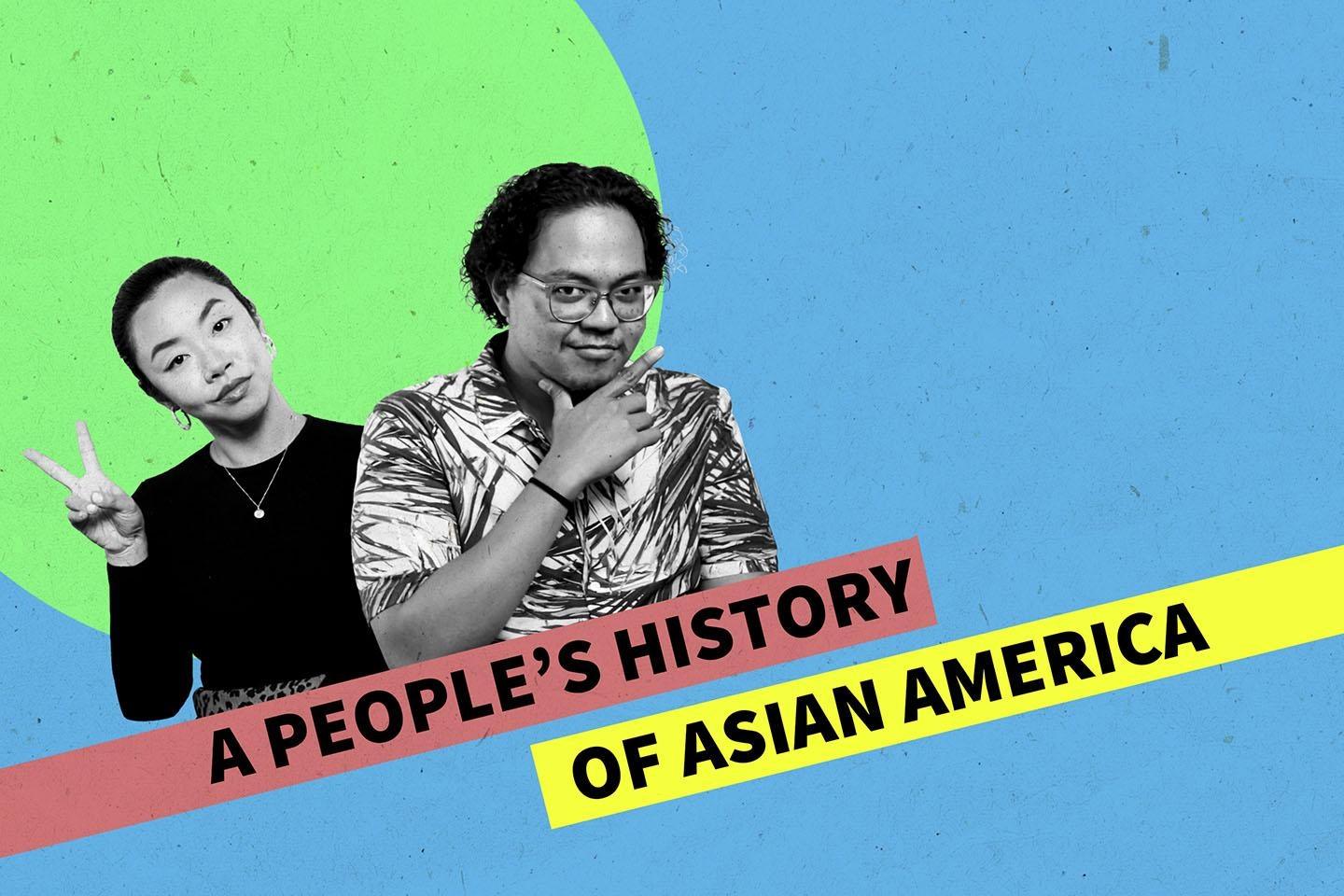Beginning May 6 on PBS Voices, a YouTube Channel Documenting the Human Experience
New Miniseries Hosted by Journalist Dolly Li and Professor Adrian De Leon Addresses Increase in Hate Crimes and Anti-Asian Sentiment in the U.S.
ARLINGTON, VA; May 6, 2021 – In direct response to the increased violence and hateful rhetoric against Asian Americans, PBS Digital Studios in partnership with the Center for Asian American Media (CAAM) debuts A PEOPLE’S HISTORY OF ASIAN AMERICA. The four-part miniseries premieres Thursday, May 6 on PBS Voices, a documentary-focused YouTube channel by PBS Digital Studios, and is also available on PBS.org and the PBS Video app.
Journalist Dolly Li and Professor Adrian De Leon guide audiences in explainer-style videos with informed and empowering perspectives, helping to break down common microaggressions and reveal the stereotypes, racism and xenophobia behind certain statements. Episodes examine the rise in anti-Asian sentiment amid the COVID-19 pandemic, the “model minority” myth and the hyper-sexualization of Asian women, among other topics.
“As PBS’s documentary hub on YouTube, PBS Voices extends public media’s efforts to foster dialogue and deepen awareness around the many ways in which diversity makes our great nation stronger,” said Brandon Arolfo, Head of PBS Digital Studios. “While A PEOPLE’S HISTORY OF ASIAN AMERICA reveals some difficult truths, we are proud to stand in solidarity with the Asian American community and present informed perspectives that we believe will empower our audiences to create a future free of hate, intolerance and racism.”
"Asian Americans have been an integral part of this country, but the roots of anti-Asian sentiment and damaging stereotypes about the community go back almost as far," says CAAM Executive Director Stephen Gong. "CAAM is excited to support Dolly Li and Adrian De Leon’s A PEOPLE'S HISTORY OF ASIAN AMERICA to help excavate the origins of the many microaggressions against Asian Americans and to tell the stories of our diverse community that are fundamental to our national experience."
A PEOPLE’S HISTORY OF ASIAN AMERICA on PBS Voices begins Thursday, May 6 with episodes released on a weekly basis throughout Asian American and Pacific Islander Heritage Month:
A PEOPLE’S HISTORY OF ASIAN AMERICA “How ‘The China Virus’ Has Always Been A Part of U.S. History”
Premieres: Thursday, May 6
Producer: Plum Studios/CAAM/PBS Digital Studios
Description: The term “China Virus” emerged in the 2020 pandemic and became normalized by pundits, politicians, and even the president, exacerbating racism and violence experienced by Asian people in the U.S. Dolly and Adrian argue that the concept of the “China Virus” has always existed throughout U.S. history and that the xenophobic sentiment that Asian people are invasive has resulted in a cycle of violence that dates all the way back to the 1800s.
A PEOPLE’S HISTORY OF ASIAN AMERICA “Unpacking Asian Fetish from an Intersectional/Feminist Perspective”
Premieres: Thursday, May 13
Producer: Plum Studios/CAAM/PBS Digital Studios
Description: Where does the Asian fetish come from and how can we connect the dots between early anti-Asian exclusion laws and the 2021 Atlanta mass shooting that targeted Asian spas? Dolly and Adrian try to make sense of the tragedy, reconciling it with the existence of the 1875 Page Act that explicitly banned “immoral Chinese women.” Dolly interviews scholars who study race and gender to learn about how orientalism has shaped the West’s understanding of both Asian men and women, and how we can learn from Black feminists about combating these dangerous stereotypes that impact Black women and women of color.
A PEOPLE’S HISTORY OF ASIAN AMERICA “AAPI, APA, APIDA, AANHPI or Asian American?”
Premieres: Thursday, May 20
Producer: Plum Studios/CAAM/PBS Digital Studios
Description: How many A’s in AAPI? Dolly and Adrian explore the origins of Asian American Pacific Islander Heritage month, examining both the legacy of “Asian American” as a radical term and the need to disaggregate data to show more nuance in the demographics of this large and diverse community. We hear from South Asian, Southeast Asian, and Pacific Islander voices to explore the pros and cons of Asian American as a term.
A PEOPLE’S HISTORY OF ASIAN AMERICA “Microaggression or Not Microaggression”
Premieres: Thursday, May 27
Producer: Plum Studios/CAAM/PBS Digital Studios
Description: Dolly and Adrian host a reenactment of one of Adrian’s ethnic studies classes, asking the students to explain whether certain experiences are microaggressions or not microaggressions. Through satire and a format that’s become familiar to students all around the country who have experienced more than a year of remote learning, we create a definitive guide to combating microaggressions in the real world.
About the Hosts:
Dolly Li
Dolly Li is an award-winning video journalist and documentarian. She tells investigative and nuanced cultural stories about communities such as the Mississippi Delta Chinese, Korean American adoptees, and global Asian diaspora. Her videos have appeared on Al Jazeera, the South China Morning Post and other outlets.
In 2017, she won a Regional Emmy in Northern California for her AJ+ (Al Jazeera) short documentary, How Chop Suey Saved San Francisco’s Chinatown, the first episode of a three-part documentary series examining Chinese cuisine from the Mississippi Delta to the San Gabriel Valley. In 2018, Dolly moved to Hong Kong and co-founded Goldthread, a video publication focused on food, culture, and travel stories, incubated by the South China Morning Post. She returned to the U.S. in 2019 and founded Plum Studios to continue telling stories that center diverse communities. She is based between Los Angeles and New York.
Adrian De Leon
Adrian De Leon is a historian, poet and essayist at the University of Southern California. He is an Assistant Professor of American Studies and Ethnicity, with affiliations at the Center for Transpacific Studies, the East Asian Studies Center and the Equity Research Institute. He holds a B.A. (Honors, with distinction) in English from the University of Toronto Scarborough (2014)and a Ph.D. in History from the University of Toronto (2019), where he was a Junior Fellow at Massey College, a SSHRC Bombardier Doctoral Scholar and a Fulbright Canada Scholar. In 2020, his dissertation was awarded the Governor General’s Gold Medal.
Adrian is the author of two poetry collections, and his writing has appeared in The Conversation, The Puritan, Canadian Literature, Joyland Magazine, Radical History Review, Amerasia, and other creative and scholarly venues.
For more information on PBS Digital Studios and PBS Voices, visit PBS.org and the PBS YouTube Channel. Viewers are also encouraged to engage in online conversation by tagging @PBS and using #PBSVoices on Facebook, Twitter and Instagram.
Throughout the month of May, PBS is illuminating stories featuring the Asian American experience on air, PBS.org and the PBS Video app. For the press release on PBS’s ongoing educational programming honoring the Asian American and Pacific Islander community, please visit PBS.org.
About CAAM:
The Center for Asian American Media is a nonprofit organization dedicated to presenting stories that convey the richness and diversity of Asian American experiences to the broadest audience possible. We do this by funding, producing, distributing and exhibiting works in film, television and digital media. For 40 years, CAAM has exposed audiences to new voices and communities, advancing our collective understanding of the American experience through programs specifically designed to engage the Asian American community and the public at large.
About PBS Voices
PBS Voicesis a documentary-themed YouTube channel by PBS Digital Studios, which brings together curated content from PBS member stations and independent filmmakers across the country to fulfill viewers’ curious minds. Each program on PBS Voices features an array of fascinating, relatable stories celebrating shared human experiences.
About PBS Digital Studios
PBS Digital Studios produces original, digital programming for YouTube and Facebook, designed to engage, enlighten, and entertain online audiences. The PBS Digital Studios network has more than 27 million subscribers, generating an average of 50 million views a month and has acquired more than three billion lifetime views. Currently, the Studio has 20 original series streaming online, including eight series from PBS member stations. Series include the Webby Award-winning IT’S OKAY TO BE SMART and CRASH COURSE, as well as popular series such as TWO CENTS, EONS and PBS SPACE TIME.
About PBS
PBS, with more than 330 member stations, offers all Americans the opportunity to explore new ideas and new worlds through television and digital content. Each month, PBS reaches over 120 million people through television and 26 million people online, inviting them to experience the worlds of science, history, nature, and public affairs; to hear diverse viewpoints; and to take front row seats to world-class drama and performances. PBS’ broad array of programs has been consistently honored by the industry’s most coveted award competitions. Teachers of children from pre-K through 12th grade turn to PBS for digital content and services that help bring classroom lessons to life. Decades of research confirms that PBS’ premier children’s media service, PBS KIDS, helps children build critical literacy, math and social-emotional skills, enabling them to find success in school and life. Delivered through member stations, PBS KIDS offers high-quality educational content on TV – including a 24/7 channel, online at pbskids.org, via an array of mobile apps and in communities across America. More information about PBS is available at www.pbs.org, one of the leading dot-org websites on the internet, or by following PBS on Twitter, Facebook or through our apps for mobile and connected devices. Specific program information and updates for press are available at pbs.org/pressroom or by following PBS Communications on Twitter.




